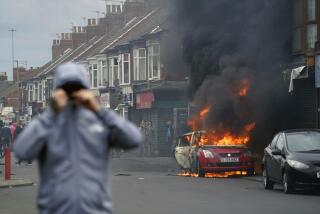Soccer Violence Continues
- Share via
LONDON — Once again, English soccer fans couldn’t stay away from trouble.
The stabbing deaths of two Leeds United fans on the streets of Istanbul have further tarnished English soccer’s reputation.
With England wanting to stage the 2006 World Cup, bid organizers hate being reminded about its country’s violent soccer history, which dates back more than a quarter of a century.
While 1966 World Cup stars Bobby Charlton and Geoff Hurst travel the world trying to drum up votes to defeat bids from Germany, Brazil, South Africa and Morocco, the roll of dishonor is still fresh in people’s minds.
Wednesday’s killings in Istanbul on the eve of Leeds United’s UEFA Cup semifinal game against Galatasaray reopened the debate about the behavior of English fans and how it has spawned violence by fans in other countries.
After a decade of violence across Europe, English soccer sank to a low in Brussels on May 29, 1985, when Liverpool fans rioted at the Champions Cup final against Juventus at the Heysel stadium. Thirty-nine people died when a wall collapsed under the weight of fleeing fans.
Soccer’s European governing body, UEFA, initially banned English clubs from its competitions indefinitely. The ban was later reduced to five years.
The use of video cameras and well-organized security in domestic stadiums has led to a reduction of trouble at home, and there was little sign of English hooligans when the clubs returned to European competition in 1991. But the violence has been creeping back.
English fans fought with locals and police at the 1992 European Championships in Sweden, and an exhibition game against Ireland in Dublin was abandoned because of rioting by English fans in February 1995.
One of the problems affecting English teams playing abroad is that their large number of followers are infiltrated by ultra right-wing thugs from a group known as Combat 18.
These extremists were held responsible for the riots in Malmo and Dublin and also were involved in the trouble at Zaragoza, when Chelsea followers were sprayed with tear gas during a Cup Winners Cup game in April 1995.
English soccer also has a higher profile because its clubs are achieving success in Europe.
Manchester United is the Champions Cup holder, Chelsea won the Cup Winners Cup two seasons ago, and both have a great chance to reach this season’s Champions Cup semifinals. Leeds and Arsenal have made it to the semifinals of the UEFA Cup, so English clubs could wind up with both titles.
The result, said Football Association executive director David Davies, is that English clubs have played more games abroad this season than any other with remarkably little trouble.
“There was one previous incident involving Chelsea fans in Marseille and it was found that Chelsea should not take the blame,” Davies said. “Otherwise there have been no other incidents.”
Davies saw no reason why the deaths in Istanbul should have any impact on England’s bid for the 2006 World Cup.
“As far as the vote on July 6 is concerned about a World Cup here in England, some six years from now, I don’t expect it will be a factor,” he said. “I don’t think these incidents, however terrible, will be a factor when 24 people sit down to make that decision.”
English supporters, meanwhile, say they don’t get enough protection when traveling abroad.
While Istanbul police questioned 16 locals about the fatal stabbing of Kevin Speight and Christopher Loftus, Alison Pilling, chairwoman of England soccer’s Football Supporters Association, said police had ignored the safety of the peaceful fans.
“We are particularly angry that it is still not possible for law-abiding English fans to travel abroad to matches secure in the belief that their safety is paramount,” Pilling said. “It is completely unacceptable that the police and other authorities in Istanbul cannot guarantee the safety of people traveling to watch their team.”
More to Read
Go beyond the scoreboard
Get the latest on L.A.'s teams in the daily Sports Report newsletter.
You may occasionally receive promotional content from the Los Angeles Times.







